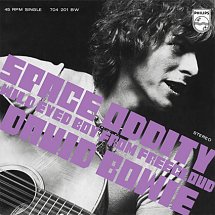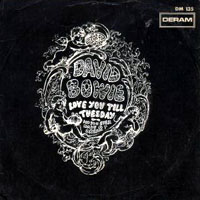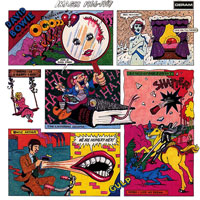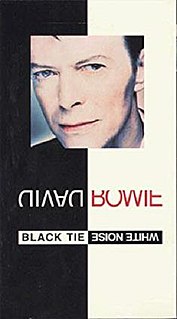
Hunky Dory is the fourth studio album by English singer-songwriter David Bowie. Released on 17 December 1971, it was his first album for RCA Records, which would be his label for the next decade. It was recorded in mid-1971 at Trident Studios in London and featured Rick Wakeman on piano, and the musicians who would later become known as the Spiders from Mars – Mick Ronson, Trevor Bolder and Mick Woodmansey. The album was co-produced by Bowie and Ken Scott, who had engineered Bowie's previous two albums. Hunky Dory was Scott's first album as a producer; he went on to co-produce Bowie's next three records.

"Space Oddity" is a song written and recorded by English singer-songwriter David Bowie. It was first released as a 7-inch single on 11 July 1969 before appearing as the opening track of his second studio album, David Bowie. It became one of Bowie's signature songs and one of four of his songs to be included in The Rock and Roll Hall of Fame's 500 Songs that Shaped Rock and Roll.

David Bowie is the self-titled debut studio album by English musician David Bowie, released on 1 June 1967, on Deram Records.

David Bowie is the second studio album by the English musician David Bowie, released under that title by Philips in the UK, and as Man of Words/Man of Music by Mercury in the US, on 14 November 1969. It was reissued in 1972 by RCA Records as Space Oddity.

Ziggy Stardust: The Motion Picture is a live album by English musician David Bowie, released in October 1983 in correspondence with the film of the same name. The music was recorded during the Ziggy Stardust Tour at the Hammersmith Odeon in London on 3 July 1973, although the album was not issued by RCA Records until 1983. Prior to that it had existed in bootleg form, notably His Masters Voice – Bowie and the Spiders From Mars' Last Stand.

"The Man Who Sold the World" is a song written by English singer-songwriter David Bowie. The title track of Bowie's third studio album of the same name, it was released in November 1970 in the US and in April 1971 in the UK by Mercury Records. Produced by Tony Visconti, it was recorded at Trident and Advision Studios in London in May 1970, towards the end of the album's sessions; Bowie recorded his vocal on the final day of mixing for the album, reflecting his generally dismissive attitude during the sessions. Musically, it is based around a "circular" guitar riff from Mick Ronson. Its lyrics are cryptic and evocative, being inspired by numerous poems including "Antigonish" by William Hughes Mearns. Bowie's vocals are heavily "phased" throughout and have been described as "haunting".

Love You till Tuesday is a promotional film designed to showcase the talents of David Bowie, made in 1969. The film was an attempt by Bowie's manager, Kenneth Pitt, to bring Bowie to a wider audience. Pitt had undertaken the film after a suggestion by Günther Schneider, producer of German TV show 4-3-2-1 Musik Für Junge Leute for the ZDF network. The film ended up being shelved, and was not released until 1984, when it finally came out on VHS. A DVD version was released in UK in 2005.

"Rubber Band" is a single by David Bowie. The single was released in the UK in December 1966, and marked the start of Bowie's recording contract with Deram which would include his first album, 1967’s David Bowie.

"Love You till Tuesday" is a song written and performed by David Bowie. The first version of the song, recorded in February 1967, was included on Bowie's debut album. A second version, released as a single, was recorded on 3 June 1967 and released on 14 July 1967. The single garnered good notices from the music press but, like his earlier singles, failed to break into the British charts. It was his final new release for Deram Records. Bowie's 1969 showpiece film Love You till Tuesday took its name from the song, which also featured over the opening credits.

"Drive-In Saturday" is a song by English singer-songwriter David Bowie from his 1973 album Aladdin Sane. It was released as a single a week before the album and, like its predecessor "The Jean Genie", became a Top 3 UK hit.
"Wild Eyed Boy from Freecloud" is a song written by David Bowie, first recorded in June 1969 and released as a B-side to his single "Space Oddity". Bowie then rerecorded the song for his second eponymous album.

"Ragazzo solo, ragazza sola" is a version of David Bowie's first hit single "Space Oddity" with Italian lyrics by Mogol. Bowie recorded the Italian vocal on 20 December 1969.

"Hallo Spaceboy" is a song by David Bowie from his 1995 album Outside. The track was re-recorded the following year, and issued as a remix featuring Pet Shop Boys as guest artists. Bowie and Brian Eno co-wrote the original album version of the song.

The Deram Anthology 1966–1968 is a compilation album by David Bowie, released in 1997. It collects together most of the material Bowie recorded for Deram Records that has been previously released in some form, including the 1967 debut album in its entirety, in chronological order. Tracks 24-27 were mixed/recorded in 1969 after Bowie was dropped from Deram Records and were for the promotional video "Love You Till Tuesday", made to sell Bowie to a new label. Thus Deram originally had nothing to do with these tracks.

Images 1966–1967 is a compilation album by English singer-songwriter David Bowie. It comprises his first long player release as a solo artist for Deram Records, titled David Bowie, released in 1967, and various singles and B-sides recorded for Deram during 1966 and 1967.

The World of David Bowie is a compilation album by English singer-songwriter David Bowie, released in 1970 by Decca Records. It contains material from his first album David Bowie, as well as previously unreleased songs. The track listing was chosen by Bowie himself. The sleeve photo is by Ian Dickson.

Bowie – The Video Collection is a video album by David Bowie, released in 1993. It included most official music videos made by Bowie between 1972 and 1990.

"Ashes to Ashes" is a song written and recorded by English singer-songwriter David Bowie. It was the lead single from the 1980 album Scary Monsters and became Bowie's second UK No. 1 single. It is also known for its innovative video, directed by Bowie and David Mallet, which at the time was the most expensive music video ever made.

David Bowie: Black Tie White Noise is a 1993 film accompanying the release of the David Bowie album of the same name. The primary purpose of the film was to remove the need of a tour to promote the album. It was directed by long time Bowie collaborator David Mallet, and was originally released in 1993 on VHS.

















